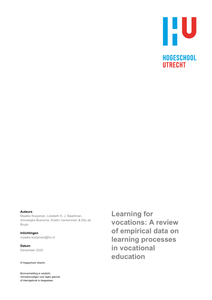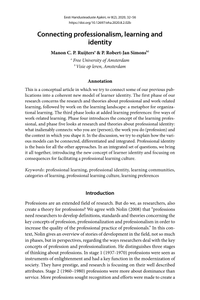In this article, we elaborate on the role of dialogical learning in identity formation in the context of environmental education. First, we distinguish this kind of learning from conditioning and reproductive learning. We also show that identity learning is not self-evident and we point out the role of emotions. Using Dialogical Self Theory, we then suggest that individuals do not have an “identity hierarchy” but a dialogical self that attaches meaning to experiences in both conscious and unconscious ways. We describe the learning process that enables the dialogical self to develop itself, and we elaborate on the characteristics of a good dialogue. We conclude with some remarks expanding room for a dialogue that would foster identity learning. https://doi.org/10.3390/resources5010011 https://www.linkedin.com/in/helenkopnina/
MULTIFILE

Teacher professional identity is conceptualized in this chapter as a complex configuration of personal and contextual factors. Professional identity is also seen as dynamic and subject to change. This coloring of the concept leads here to a specific elaboration of research with regard to (student) teachers’ identity formation. This research then focuses on (student) teachers working on issues arising from tensions between the personal and the contextual, the ways in which they position themselves toward relevant others, the impact of the micropolitical reality of the school on their functioning and well-being, and the role so-called “stories to live by” play in their work. The operationalization of the concept is illustrated by two studies in which the complexity and uniqueness of (the development of) professional identity have been investigated using narrative methods and techniques. This chapter also distinguishes between two different but related internal processes that are important in teacher education, namely professional learning internalizing knowledge and skills that are generally found to be relevant for the profession, i.e., teaching competence) and identity formation (a personal process of validating learning experiences in light of one’s “image-ofself-as-teacher,” that is, the teacher that one is and wants to become). It is argued that both processes can reinforce and enrich each other and, as such, will result in a more comprehensive and coherent framework for understanding teachers’ professional work and their development as teachers. An attempt is made to present both internal processes in an overarching model, referred to here as “framework of professional identity learning.” The chapter concludes with suggestions for (follow-up) research.
DOCUMENT
This chapter explores qualitative career assessment as an identity learning process where meaning-oriented learning is essential and distinguished from conditioned or semantic types of learning. In order to construct a career identity in the form of a future-oriented narrative, it is essential that learners are helped through cognitive learning stages with the help of a dialogue about concrete experiences which aims to pay attention to emotions and broadens and deepens what is expressed.
DOCUMENT
This article reports on a literature review on empirical research investigating learning for vocations in the context of vocational education. We included 36 studies in which learning for vocations is empirically studied. Learning for vocations is characterised based upon prevalent research traditions in the field and framed from the perspective of vocational education and organised learning practices. This framing and characterisation directed the search terms for the review. Results show empirical data on vocational learning and illustrate how learning processes for the functions of vocational education - vocational identity development, development of a vocational repertoire of actions, and vocational knowledge development - actually take place. The review further shows that, empirical illustrations of learning processes that occur in the context of vocational education and organised learning practices are relatively scarce. The findings can be typified in relation to our theoretical framework in terms of three learning processes, that is learning as a process of (a) belonging, becoming, and being, (b) recontextualization, and (c) negotiation of meaning and sense-making. We argue that more empirical research should be carried out, using the functions of vocational education and the three learning processes to better understand vocational learning.
DOCUMENT

The growing complexity of care and healthcare workforce shortages in the Netherlands necessitates exploring interprofessional collaboration (IPC). However, the predominant single-professional education may result in a professional identity (PI) among healthcare students, which may not support successful IPC. Internships in student-run interprofessional learning wards (SR-IPLW) could foster interprofessional identity (IPI) development. There is a need for a better understanding of the intricacies involved in learning to work collaboratively, particularly when undergraduates are still shaping their professional identities. Our aim, therefore, was to identify facilitators and barriers for interprofessional education (IPE), IPC, and identity development among 21 healthcare students during a 20-week clinical placement on a SR-IPLW in rehabilitation medicine. An action-based prospective study using grounded theory analysis of nine focus groups across three semesters identified 17 theoretical codes. These codes are elaborated in a conceptual model highlighting facilitators and barriers for IPC and identity development, emphasizing the importance of fostering feelings of relatedness, competence, and autonomy. There are indications that professional and interprofessional identities changed during the internship. Implications for preceptors are delineated, showing the importance of personal relationships and elements of a positive learning climate.
DOCUMENT
The cultivation of intrinsic motivation is key in the 21th century, but most students in Dutch vocational education lack this quality. To foster intrinsic motivation, a strong career-learning environment is needed that enables students to develop career competencies and a career identity. However such an environment is absent in much of vocational education in The Netherlands. Research shows that the desired learning must be practice based (real life experiences are key), enable a dialogue (in order to attach personal meaning to real life experiences) and give students more autonomy in making choices in their school careers. Although there has been an increase in the use of portfolios and personal-development plans, these instruments are used mainly for improving success at school but are not in career and work. In addition research on the conversations between student and teachers/work-place mentors shows that the latter talk primarily to (65%), and about (21%), but rarely with (9%) students. The culture in schools is still predominately monological. Most teachers feel uncertain about their abilities to help students in developing career competencies and a career identity, though a growing number of teachers want to be trained in initiating meaningful career dialogues. In order to make such training successful in terms of promoting new guidance behaviours, it is essential that school managers create a strong career-learning environment for teachers. The Standards Era policies (Gatto, 2009) that dominate Dutch vocational education at the moment, however, leaves managers little space to do so. https://doi.org/10.1007/978-3-319-50734-7_7 LinkedIn: https://www.linkedin.com/in/reinekke-lengelle-phd-767a4322/
MULTIFILE

This is a conceptual article in which we try to connect some of our previous publications into a coherent new model of learner identity. The first phase of our research concerns the research and theories about professional and work-related learning, followed by work on the learning landscape: a metaphor for organizational learning. The third phase looks at added learning preferences: five ways of work-related learning. Phase four introduces the concept of the learning professional, and phase five looks at research and theories about professional identity: what inalienably connects: who you are (person), the work you do (profession) and the context in which you shape it. In the discussion, we try to explain how the various models can be connected, differentiated and integrated. Professional identity is the basis for all the other approaches. In an integrated set of questions, we bring it all together, introducing the new concept of learner identity and focusing on consequences for facilitating a professional learning culture.
DOCUMENT

DOCUMENT

This study focuses on the complexity and uniqueness of 45 beginning teachers’ professional identity, an important perspective that is usually not an explicit part of induction programmes. Data were collected in four workshops designed to support beginning teachers in reflecting on personal and contextual aspects that influence (the development of) their professional identity. Based on these reflections, portraits of each teacher were constructed. Five overarching identity themes emerged from these portraits: Classroom management, Students learning, Workload, Collaboration and Standing up for oneself. All themes were visualised into a configuration consisting of personal and contextual aspects, arranged according to three foci: focus on oneself, on students, and on team/organisation. The configurations differ in their magnitude but do justice to the unique and complex nature of each teacher. Constructing configurations is a promising way for understanding what really matters in beginning teachers’ professional identity development and helping them deepen their reflection.
LINK
This essay addresses the relationship of improvisation and identity. Biographicalresearch that was conducted by the author into professional musicians’ lifelong learning showed the huge importance of improvisation for personal expression. Musically, the concept of sound appeared to serve as a strong metaphor for identity. In addition, ethnographic research conducted as part of the project Music for Life in London, and published by Smilde, Page and Alheit in 2014, where musicians work in creative music workshops with people with dementia and their caregivers, shed light on the use of improvisation as an expression of the identity of ‘the other’ (i.e. the person with dementia). Sound again appeared to serve as a metaphor for identity. The essay draws on the work of George Herbert Mead on identity, which distinguishes between the personal ‘I’ and the social ‘Me’, and points out that both aspects are essential for the self. In this sense, improvisation can be conceived as a means of communication thatconnects the personal with the social. Furthermore, drawing on Paul Ricoeur’s Oneself as Another (1992), it is shown that this concept of improvisation in relation to personal and social identity may be transferred to forms of community engagement through music. However, despite its huge importance, improvisation is still often marginalised in specialist higher music education, particularly in conservatoires, and the essay finishes with a strong plea for conservatoires to take up their role in the midst of society and embed improvisation in the core of the curriculum.
DOCUMENT